|
|
|
Sort Order |
|
|
|
Items / Page
|
|
|
|
|
|
|
| Srl | Item |
| 1 |
ID:
107221
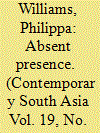

|
|
|
|
|
| Publication |
2011.
|
| Summary/Abstract |
This paper examines the everyday experiences and perspectives of Muslim Ansa-ris (weavers) in urban north India with respect to the 'welfare state'. The case of a recent health insurance scheme, initiated by the Indian government, constitutes the paper's focus. Narratives around the scheme expressed by residents in a majority Muslim mohalla- (neighbourhood) in Varanasi illustrate the ways in which the state's presence was more often experienced through its perceived absence and inaccessibility. But even whilst such experiences represented broader patterns of neglect, locally interpreted as the upshot of being India's largest religious minority, this community was not stricken by a sense of absolute alienation and nor did individual or collective actions exhibit outright disaffection towards the state. More appropriately, 'defensive agencies' informed by degrees of pragmatism, acceptance and resilience, were articulated in an effort to protect, as well as improve the future capacities and ambitions of the neighbourhood residents where the state had seemingly failed. The paper concludes however with a word of caution about celebrating such agency, and reflects on the potential for transformative politics by Muslims in urban India.
|
|
|
|
|
|
|
|
|
|
|
|
|
|
|
|
| 2 |
ID:
139661
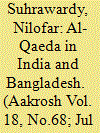

|
|
|
| 3 |
ID:
123033
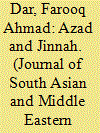

|
|
|
| 4 |
ID:
182814
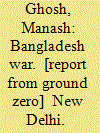

|
|
|
|
|
| Publication |
New Delhi, Niyogi Books, 2021.
|
| Description |
209p.hbk
|
| Standard Number |
9789391125370
|
|
|
|
|
|
|
|
|
|
|
|
Copies: C:1/I:0,R:0,Q:0
Circulation
| Accession# | Call# | Current Location | Status | Policy | Location |
| 060122 | 954.92051/GHO 060122 | Main | On Shelf | General | |
|
|
|
|
| 5 |
ID:
193288
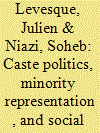

|
|
|
|
|
| Summary/Abstract |
Social stratification among Muslims in South Asia, specifically the phenomenon of Muslim caste, has recently gained scholarly and media attention, particularly in India. However, the public discussion – often empirically shallow and politically polarized – fails to adequately explain the mechanisms through which Muslims perpetuate social inequality while invoking egalitarian principles. This special section, based on a panel held at the 2022 BASAS annual conference, aims to contribute to the scholarly and public discourse by advocating for the study of Muslim caste associations. Taking the associational life of caste into account provides a tangible object of study. Moreover, it shifts the focus away from macro-level discussions towards an empirically grounded analysis at the meso- and micro-levels. This introduction explores two central aspects. First, we suggest that caste associations offer a fresh perspective on the study of Muslim social mobility, beyond the oft-assumed imitation of dominant caste groups or Ashrafization. Second, documenting caste associations helps us understand the diversity of Muslim representation, specifically, the tension between Muslim minority politics and Muslim caste politics. Overall, this special section provides multiple examples of Muslims’ associational engagements with caste, which encompass endeavours as diverse as political assertion, declassing, social exclusion, or universal charitable aspirations.
|
|
|
|
|
|
|
|
|
|
|
|
|
|
|
|
| 6 |
ID:
128481
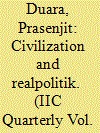

|
|
|
| 7 |
ID:
101825
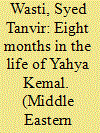

|
|
|
|
|
| Publication |
2011.
|
| Summary/Abstract |
With the end of British rule in the Indian sub-continent in 1947 and the establishment of the new state of Pakistan, the traditionally close relations between the Turks and the Indian Muslims were consolidated with the appointment of Turkey's senior poet-diplomat, Yahya Kemal Beyatli, as the first Ambassador of the Republic of Turkey to Pakistan. The ageing Ambassador filled this position for eight months under difficult circumstances until after the death of the founder of Pakistan, Mohammed Ali Jinnah. Based on Yahya Kemal's letters and other available information, the article attempts to capture the atmosphere surrounding Yahya Kemal's sojourn in Karachi.
|
|
|
|
|
|
|
|
|
|
|
|
|
|
|
|
| 8 |
ID:
162868


|
|
|
| 9 |
ID:
096051
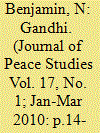

|
|
|
| 10 |
ID:
141688
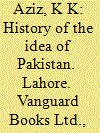

|
|
|
|
|
| Publication |
Lahore, Vanguard Books Ltd., 1987.
|
| Description |
xiii, 623-838p.hbk
|
| Contents |
Vol. III
4 Vol. Set Price is Rs. 800.00
|
|
|
|
|
|
|
|
|
|
|
|
Copies: C:1/I:0,R:0,Q:0
Circulation
| Accession# | Call# | Current Location | Status | Policy | Location |
| 031875 | 954.91/AZI 031875 | Main | On Shelf | General | |
|
|
|
|
| 11 |
ID:
157084
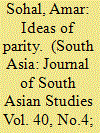

|
|
|
|
|
| Summary/Abstract |
Historians have suggested that the politics of late colonial India centred on a battle between two discrete ideas: Indian and Muslim nationalism. Complicating this binary, this paper focuses on three conceptions of parity between religious groups, contending that this logic transcended Mohammad Ali Jinnah's and the Muslim League's call for constitutional equality between Hindus and Muslims to shape a wider debate about how to defy communal majoritarianism and exit identity politics altogether. Just as Jinnah sought to prevent Hindu dominance within a single state, the Akali Sikhs—influenced as much by a negative historical imagination as the contemporary logic of numbers—produced their own constitutional claim in order to avert Muslim supremacy in the Punjab. Meanwhile Maulana Abul Kalam Azad, president of the Indian National Congress between 1940 and 1946, posited a unique thesis: since modern India was the joint construction of Hindus and Muslims, parity already existed. Though he held that Jinnah's call for constitutional parity was consequently superfluous, Azad's idea of the shared nation led him to search for a genuine consensus, rather than a simple truce, between India's two major political parties. This paper argues that the 1946 Cabinet Mission Plan, offering a degree of parity between communities whilst retaining Indian unity, represented the near-realisation of these three ideas.
|
|
|
|
|
|
|
|
|
|
|
|
|
|
|
|
| 12 |
ID:
122446
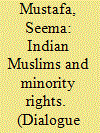

|
|
|
|
|
| Publication |
2013.
|
| Summary/Abstract |
Post 9/11, the West descended on India seeking answers to the one
question: why are Indian Muslims not terrorists? I attended any number
of 'private' meetings organized by embassies of the Western countries
in New Delhi with Muslims in India and their behavior patterns as the
sole issue for discussion. In the process one ate a variety of cuisines,
joining other carefully selected Muslims to help the missions and their
governments understand the 'peculiar' character of the Indian Muslims
that kept them away from the turbulence of Pakistan and the Middle
East, and secular in their response. Paradoxically, the official
Government of India position is that Indian Muslims are not terrorists,
even though covertly more and more are being arrested and detained
under various terror laws.
|
|
|
|
|
|
|
|
|
|
|
|
|
|
|
|
| 13 |
ID:
128128
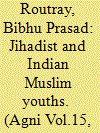

|
|
|
|
|
| Publication |
2013.
|
| Summary/Abstract |
On 23 July 2013, As-Sahab, Al Qaeda's media arm, released the English translation of a video statement in had posted in June 2013 calling upon the Indian Muslims to join the Jihad in Syria. Titled "Why is there no storm in your ocean?", the video featured Mualana Aasim Umar, an Al Qaeda ideologue believed to the based in northwest Pakistan. The 11- page translation of the original video in Urdu, specially exhorted the Muslims of Delhi, Uttar Pradesh, Bihar, Southern India and Gujarat
|
|
|
|
|
|
|
|
|
|
|
|
|
|
|
|
| 14 |
ID:
028603
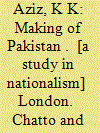

|
|
|
|
|
| Publication |
London, Chatto and Windus, 1967.
|
| Description |
223p. hbk
|
|
|
|
|
|
|
|
|
|
|
|
Copies: C:1/I:0,R:0,Q:0
Circulation
| Accession# | Call# | Current Location | Status | Policy | Location |
| 021366 | 954.9/AZI 021366 | Main | On Shelf | General | |
|
|
|
|
| 15 |
ID:
045830
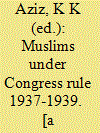

|
|
|
|
|
| Publication |
DelhI, Renaissance Publishing House, 1986.
|
| Description |
x, 347p.hbk
|
| Contents |
Vol. II
|
|
|
|
|
|
|
|
|
|
|
|
Copies: C:1/I:0,R:0,Q:0
Circulation
| Accession# | Call# | Current Location | Status | Policy | Location |
| 027573 | 954.0359/AZI 027573 | Main | On Shelf | General | |
|
|
|
|
| 16 |
ID:
186891
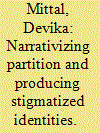

|
|
|
|
|
| Summary/Abstract |
The independence from the British rule was accompanied with partition of the Indian subcontinent on religious lines. Since partition in 1947, the two nation-states India and Pakistan have been hostile toward each other. Communalism has also been a major challenge in both these countries. The current study locates this continued hostility or the “enemy” narrative that the countries harbor not just of each other, but which also shapes the experience of a religious community within their territory. Limiting the inquiry to the Indian side, this paper explores the production of the “enemy” narrative through the discursive knowledge around partition and how it locates Muslims. The paper analyzes textbooks of two education boards in India and argues that the narrative excludes the contribution of Muslims in the nationalist movement, charts out an uncritical history of the demand for partition, and stigmatizes the Muslim community as “communal” and “unpatriotic.”
|
|
|
|
|
|
|
|
|
|
|
|
|
|
|
|
| 17 |
ID:
141020
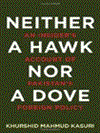

|
|
|
|
|
| Publication |
Gurgaon, Penguin Books India Pvt. Ltd., 2015.
|
| Description |
xxxvi, 851p.hbk
|
| Standard Number |
9780670088010
|
|
|
|
|
|
|
|
|
|
|
|
Copies: C:1/I:0,R:0,Q:0
Circulation
| Accession# | Call# | Current Location | Status | Policy | Location |
| 058323 | 327.5491/KAS 058323 | Main | On Shelf | General | |
|
|
|
|
| 18 |
ID:
138716
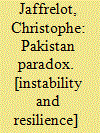

|
|
|
|
|
| Publication |
Gurgaon, Randon House Publishers India Pvt Ltd, 2015.
|
| Description |
xii, 670p.Hbk
|
| Standard Number |
9788184005745
|
|
|
|
|
|
|
|
|
|
|
|
Copies: C:1/I:0,R:0,Q:0
Circulation
| Accession# | Call# | Current Location | Status | Policy | Location |
| 058209 | 320.95491/JAF 058209 | Main | On Shelf | General | |
|
|
|
|
| 19 |
ID:
073585
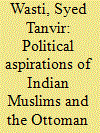

|
|
|
| 20 |
ID:
193289
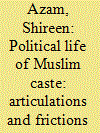

|
|
|
|
|
| Summary/Abstract |
The topic of Muslim caste has been getting space in media discourse and national politics recently through the concept of ‘Pasmanda’ – a term which refers to lower-caste Muslims. As the term gets wider purchase, it is important to question the concept and the category. What is the relationship of the category of Pasmanda with Muslim caste? Which struggles of Muslim lower castes is the term Pasmanda able to lend voice to, and what are the tensions encompassing the category. Through ethnographic fieldwork conducted in Varanasi, Uttar Pradesh, I examine a newly established organisation called the Pasmanda Adhikār Manch to explore how different single-caste associations come together under the Pasmanda banner. The caste-associations of the Halalkhor, Shah, and Nanpuz communities have the difficult task of countering the invisibilisation of Muslim caste not only by the state, but by their own caste brethren. They have limited room to demand anything from the state, considering that it hardly acknowledges the existence of their caste groups and is suspicious of their political claims as Muslims. Coming together under the Pasmanda umbrella helps provide a wider platform for assertion of Muslim caste. However, the category comes with limitations that threatens to undo its purpose.
|
|
|
|
|
|
|
|
|
|
|
|
|
|
|
|
|
|
|
|
|